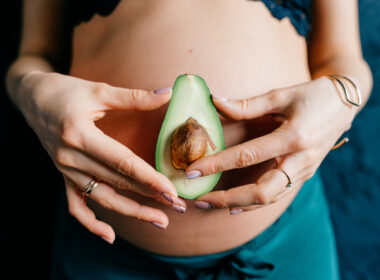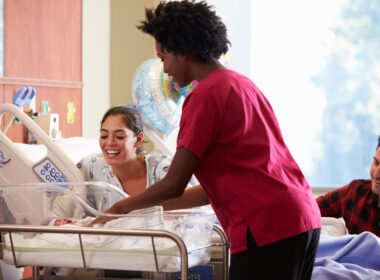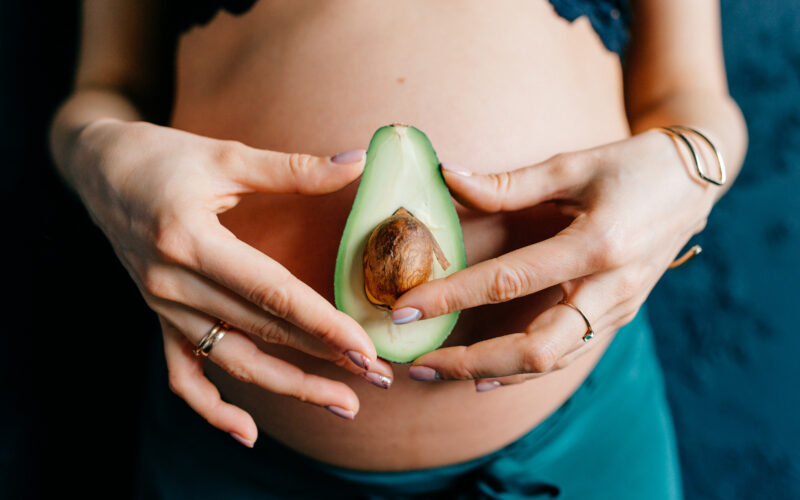It’s no secret that childhood food allergies have become far more prevalent over the past few decades. But on that front, there’s some great news for guacamole lovers who want to become parents: A недавнее исследование found that mothers who ate avocado while pregnant had children who were significantly less likely to develop a food allergy by 12 months old [1]. Being able to prevent allergic reactions simply by incorporating avocado into a few meals might give expecting moms some much-needed peace of mind. So, how strong is the connection between your avocado toast for breakfast and your baby’s risk for developing allergies?
Allergies are on the rise, and parents are getting mixed messages
As of 2021, more than 1 in 20 kids in the U.S. had a food allergy—a 50 percent increase since 2007. Guidance for parents on how to prevent allergies has shifted over the years, and in some cases has even reversed. For example, in 2008, the American Academy of Pediatrics announced that there was no evidence to support avoiding common allergens while pregnant or breastfeeding. Nor was there доказательства for delaying the introduction of these foods to infants along with other solid foods [2]. This went against decades of guidance to delay the introduction of foods like eggs, milk, and peanuts to infants for up to three years.
In 2008, the American Academy of Pediatrics announced that there was no evidence to support avoiding common allergens while pregnant or breastfeeding. Nor was there evidence for delaying the introduction of these foods to infants along with other solid foods. This went against decades of guidance to delay the introduction of foods like eggs, milk, and peanuts to infants for up to three years.
Then, in 2015, the Learning Early About Peanut Allergy (LEAP) trial decisively concluded that early exposure to peanuts was effective in предотвращение allergies. Follow-up studies have confirmed long-lasting protection for children who were introduced to peanuts during infancy, and similar results have been observed with other common allergens like eggs and milk.
If early allergen exposure is best, what about exposures in the womb?
Now, researchers are building the case that preventing child food allergies may begin in the womb, long before your little one eats their first solids. There are relatively few studies linking maternal diet during pregnancy to allergy outcomes in children, and most of these have looked at overall diet quality rather than specific foods. For example, a Mediterranean diet during pregnancy (lots of fruits and veggies, healthy fats like olive oil and nuts, and fish, with relatively low consumption of dairy and red meat) has been correlated with lower rates of allergies [1]. However, fewer studies have looked to specific foods for allergy protection. Evidence from a недавнее исследование that avocados might have a protective effect against allergies signals potential for both better protection for kids and a better understanding of how allergies develop in the first place.
About the avocado study
In March 2025, a population исследование was published in the journal Pediatric Research, which related women’s consumption of avocado while pregnant and their children’s likelihood of developing a food allergy [1].
The study used data from the Kuopio Birth Cohort (KuBiCo), a research project involving thousands of women who gave birth at the Kuopio University Hospital in Finland over the course of about a decade. Participants responded to questionnaires at the end of the first and third trimesters about whether and how often they had eaten certain foods during the last three months; avocados were just one of 163 food items on the survey. Then, after their babies were a year old, they filled out another questionnaire indicating whether or not their child had developed food allergies, rhinitis, paroxysmal wheezing, or eczema. The final analysis included 2,272 women and their babies.
What did the study find?
Of the children born to mothers who consumed любой avocado during pregnancy, 2.4% reported food allergies, while 4.2% of the children born to mothers who did не eat avocado while pregnant reported a food allergy. The study found that mothers who ate avocado during pregnancy were slightly older on average, more likely to be first-time moms, and less likely to have delivered by C-section. They were also more likely to be non-smokers, breastfeed for a longer period of time, have a lower BMI, and have a higher quality diet overall.
Of the children born to mothers who consumed любой avocado during pregnancy, 2.4% reported food allergies, while 4.2% of the children born to mothers who did не eat avocado while pregnant reported a food allergy.
These correlations may seem to cast doubt on the study’s specific claims about avocado consumption, since maternal nutrition and breastfeeding have previously been связано to fewer childhood allergies [3]. But even when researchers controlled for these factors, as well as others like marital status, education, NICU admission, alcohol consumption, and postpartum depression, the mothers who included avocado in their diet were still 43.6% less likely to report a food allergy at the 12-month follow-up. No significant correlation was found with the other three allergic outcomes (wheezing, rhinitis, or eczema). (NB: It’s also worth noting that advanced maternal age is linked to childhood allergy development, so one would have expected the slightly older moms to have been подробнее likely to have children with allergies—not less [4]!)
What’s so special about avocados?
The researchers hypothesized that avocados might play a role in preventing food allergies because of their nutritional makeup. Avocados are a nutritionally dense food, providing high levels of antioxidants, fiber, and monounsaturated fats.
Monounsaturated fat
You’ve probably already heard that avocados are a good source of healthy fats, and it’s true! One large avocado has over 13 grams of monounsaturated fat.
While the researchers noted that data specifically relating maternal consumption of this type of fat to child allergy outcomes is limited, studies with older children and adults есть shown an inverse relationship between asthma and eating monounsaturated fats.
While the researchers noted that data specifically relating maternal consumption of this type of fat to child allergy outcomes is limited, studies with older children and adults есть shown an inverse relationship between asthma and eating monounsaturated fats.
Антиоксиданты
Antioxidants such as vitamin E and zinc, both found in avocados, are thought to protect against allergic sensitivities by altering T-cell responses during fetal development (T cells, a type of white blood cell, are a key part of the immune system).
Fiber
Fiber may protect against allergies because of its beneficial effects on здоровье кишечника (which also plays an essential role in the immune system–and fertility!). Studies have suggested that when a pregnant mom consumes fiber, it essentially programs her baby’s immune responses while in the womb, helping to prevent an allergic response later in the baby’s life.
What we know about how allergies develop
Allergic reactions are a type of immune response caused by immunoglobulin E (IgE), a type of antibody. IgE antibodies live on the surface of immune cells and have a unique shape that fits onto specific antigens (markers that allow the immune system to recognize a substance as foreign). When IgE antibodies encounter a harmful foreign antigen like a virus, they alert the immune system to attack the substance. Unfortunately, IgE antibodies can mistakenly identify proteins from food or pollen as a harmful intruder, and the immune system’s response causes the symptoms of allergic reactions. However, it’s not well understood why some people develop antibodies against specific allergens and others don’t, or why some allergies are severe and others are mild.
Unsurprisingly, then, research has yet to untangle exactly how—and when—children’s immune systems develop antibodies against specific foods. As the LEAP project demonstrated, being introduced to potential allergens early on can help develop a tolerance for them. Genetics also play a role, but don’t explain the majority of cases, or why food allergies have increased so drastically over the past few decades.
Breastfeeding adds yet another major piece to the allergy puzzle. That’s right—you can add to the list of breastmilk’s abundant benefits that exclusive breastfeeding for at least 4 months can protect against food allergies [5]. This is не due to direct exposure to food proteins, as only a miniscule amount of these end up in breastmilk from food consumed by the mother [6]. However, several different molecules found in breastmilk есть been tied to child allergy outcomes, including a specific type of RNA and the concentration of polyamines [7].
As with breastfeeding, when it comes to maternal diet during pregnancy, it’s not a matter of exposing the developing baby to specific foods (eating lots of eggs during pregnancy won’t guarantee your child avoids an egg allergy), but rather supporting a more complex chain of events that primes the child’s body to accept (or reject) certain foods.
As with breastfeeding, when it comes to maternal diet during pregnancy, it’s not a matter of exposing the developing baby to specific foods (eating lots of eggs during pregnancy won’t guarantee your child avoids an egg allergy), but rather supporting a more complex chain of events that primes the child’s body to accept (or reject) certain foods.
A potential blind spot
As mentioned above, the study involving the KuBiCo data looked at many factors in addition to food intake, and the final analysis controlled for all of these factors in order to isolate the link between avocado consumption and child allergies. However, one weak point in the study’s findings is that it didn’t measure infant allergies against the сумма of avocado eaten by mothers, only whether they ate любой, at any point during the first or last trimesters. It seems hard to believe that one serving of avocado over the course of nine months could affect the child’s allergic response, and much more likely that those women who ate avocado while pregnant were reaping the benefits of a diet filled with много nutrient-dense foods, fresh fruits and veggies, and healthy fats.
The bottom line: can you prevent allergies in your children by eating (or avoiding) certain foods?
In short, the jury is still out. The authors of the avocado study emphasize that more research is needed to determine whether avocado can be directly credited for lowering allergy rates in babies. The good news is, even if avocados aren’t giving your child immunity to allergens, they’re still packed with plenty of nutrients that will support the health and growth of you и your baby during the crucial months of development in the womb.






